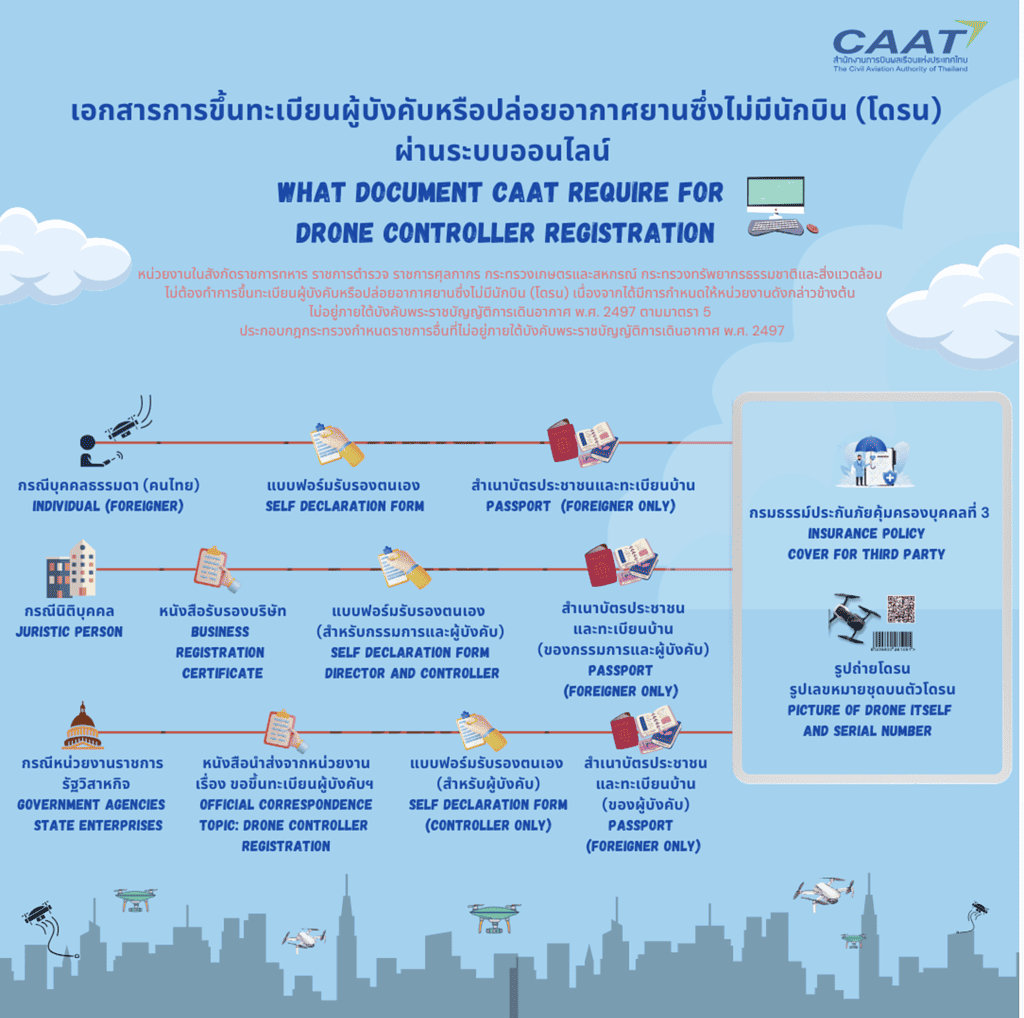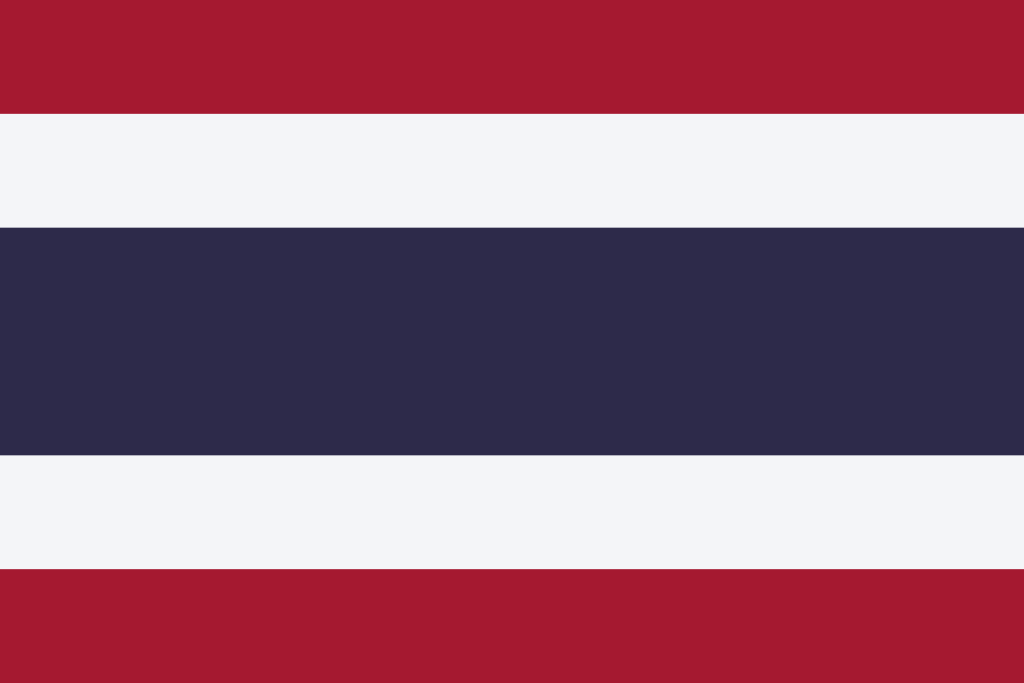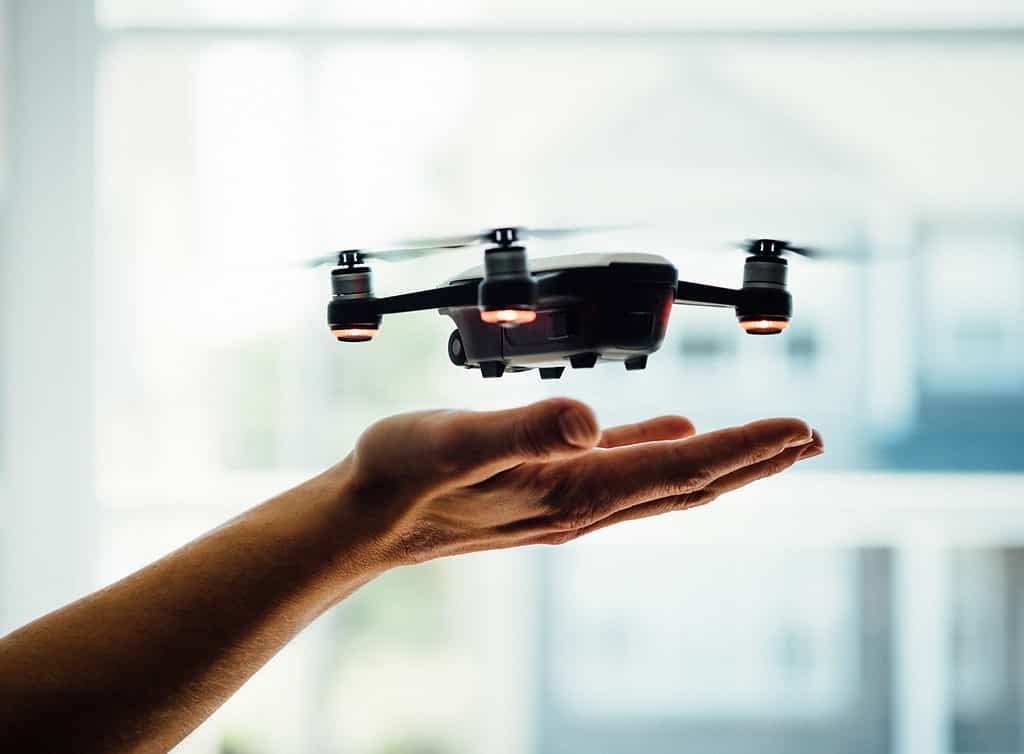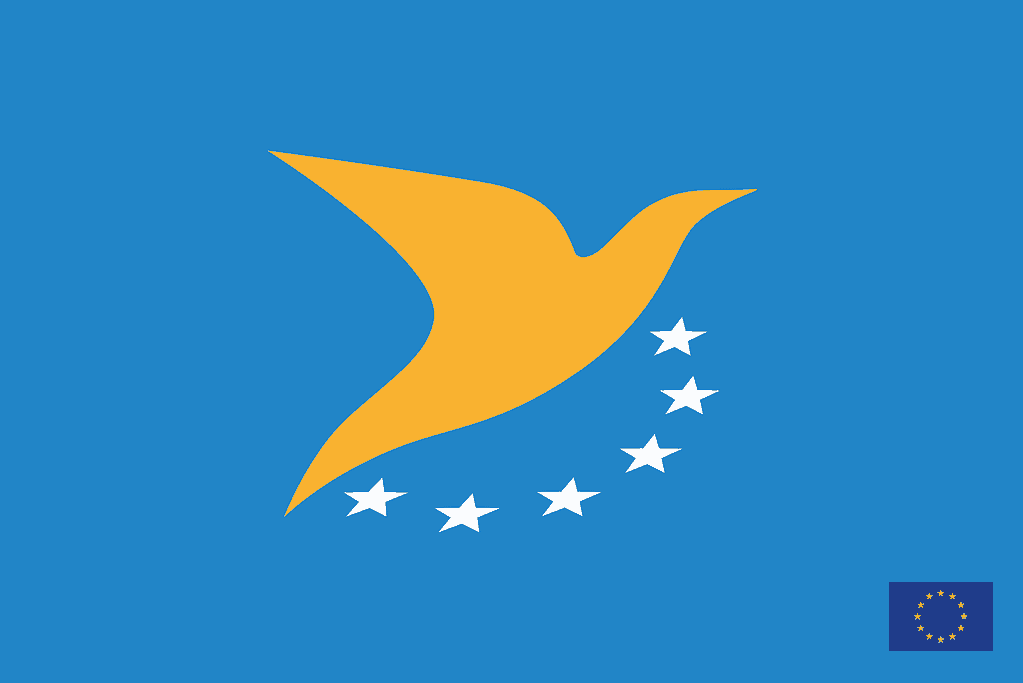Summary of Drone Laws in Thailand
Hobbyist Drone Laws For Residents of Thailand
Drone Operations in Thailand are currently regulated.
- Hobbyist drone flights are allowed in Thailand
- Hobbyist Thailand drone pilot license is required
- Hobbyist Drone registration is required in Thailand for hobbyists flying over 2kg drone, or drone with a camera
- Drone Remote ID is not required in Thailand for hobbyists
- Drone Insurance is not required but recommended for hobbyists’ drone operations in Thailand
Read below for more details on Hobbyist Drone Laws in Thailand and to find links to regulators and other credible sources!
Commercial Drone Laws For Residents of Thailand
Drone Operations in Thailand are currently regulated.
- Commercial drone flights are allowed in Thailand
- Commercial Thailand drone pilot license is required
- Commercial Drone registration is required in Thailand for commercial drone operators
- Drone Remote ID is not required in Thailand for Commercial Drone Operators
- Drone Insurance is not required for commercial drone operations in Thailand
Read below for more details on Commercial Drone Laws in Thailand and to find links to regulators and other credible sources!
Drone Regulations For Visitors To Thailand
Drone Operations in Thailand are currently regulated.
- Foreign visitor drone flights are allowed in Thailand
- Foreign visitor drone pilot license is required
- Drone registration is required in Thailand for visitors/tourists
- Drone Remote ID is not required in Thailand for tourists
- Drone Insurance is not required but recommended for tourist drone operations in Thailand
Read below for more details on Drone Laws in Thailand for Visitors (Tourists) and to find links to regulators and other credible sources!
Drone Rules For Government Drone Operators in Thailand
Drone Operations in Thailand are currently regulated.
- Government drone flights are allowed in Thailand
- Government drone pilot license is required
- Drone registration is required in Thailand for Government operations
- Drone Remote ID is not required in Thailand for Government operations
- Drone Insurance is not required for Government drone operations in Thailand
Read below for more details on Drone Laws in Thailand for Government Drone Operations and to find links to regulators and other credible sources!
Agencies Responsible for regulating drones in the Kingdom of Thailand
Drone Regulator: The Civil Aviation Authority of Thailand (CAAT)
Contact Information
If you need additional details we have not covered or specific case help, contact the Civil Aviation Authority of Thailand at:
- Address: 222 Soi Vibhavadi Rangsit 28, Vibhavadi Rangsit Rd., Chatuchak, Bangkok 10900, Thailand
- Phone: +66 (0) 2568-8851 or 063-205-8816
- Fax: +66 (0) 2568-8844
- Email: saraban@caat.or.th or info@caat.or.th
Please continue reading for more details on Thailand Drone Laws.
UAS Laws – General rules for flying drones in Thailand
The Thailand agency responsible for drone safety, CAAT, has provided several details on flying for fun or work. The highlights are enumerated below. For more details, go to the link above.
Are drones allowed in Thailand?
Here are the most important rules to know for flying a drone in Thailand:
All drones equipped with cameras must be registered.
All drones weighing more than 2 kilograms (4.4 pounds) must be registered.
Register at the CAAT online drone registration Portal.
Drones that exceed 25 kilograms (55 pounds) must be registered with the Ministry of Transport.
- At all times, drone pilots must maintain a visual line of sight with their drones.
- Drones must not be flown within a certain distance of manned aircraft.
- Drones must not be flown within 30 meters (98 feet) of any person, vehicle, construction, or building.
- Without authorization, drones must not be flown in restricted areas.
- Except with special authorization, drones may not be flown within 9 kilometers (5 miles) of an airport or temporary airfield.
- Drones may not be flown above 90 meters (295 feet).
- Airports must be kept at a distance of 9 kilometers (= 5 miles).
- You must avoid flying near crowds. It is prohibited to fly over cities and villages. Additionally, stay away from government buildings and hospitals.
- To take off and land, you must always obtain permission from the property owner. In practice, we usually resolve this by requesting permission from the guards or the information desk.
- Always keep your drone within a visual line of sight.
- Drone flights are permitted in Thailand only during daylight hours, i.e., between sunrise and sunset.
- Additionally, Thai law requires that you have an emergency plan. This includes the requirement to carry a fire extinguisher.
Where to register?
- Must register at two agencies: CAAT and NBTC
(The National Broadcasting Telecommunications Commission) - NBTC is for registering the frequency used by drones.
CAAT is for registering the persons who control and are in charge of the drone. - Registering with NBTC alone is not enough to fly a drone.
To enable you to fly your drone, you must register with an equivalent to a drone pilot’s license.

Type of Drone that must register
- A drone with camera/ recording equipment must be registered.
- A drone over 2 kilograms must be registered.
(If there is no camera/ recording equipment and the drone is not over 2 kilograms, there is no need to be registered) - Drone over 25 Kilograms must have permission from the Minister of Transport.
Note for Foreign Operators
Drones are not prohibited from entering Thailand.
Drone registration is available only within the country.
To register your drone with the NBTC, you will need the following documents:
- A copy of the passport that has been signed and stamped with the entry stamp
- Thailand registered address (hotel booking would do)
- Drone and controller photographs and serial numbers
- A copy of the drone insurance policy must include at least THB 1 million (approximately $32,000) in coverage.
After receiving approval from the NBTC, you may apply for CAAT registration.
This can be done at the CAAT online registration site, and results are typically available within 15 days.
Once registered successfully, the registration is valid for two years.
Very detailed information was provided by recent visitors in the comments below.
Notes for recreational drone pilots flying for fun in Thailand
If your drone has a camera and weighs more than 2kg, you must register it with the National Broadcasting and Telecommunications Commission (NBTC) and obtain permission to fly it. This is solely for personal use – uploading to your YouTube channel, for example.
The pilot or operator must adhere to the terms specified, which include the following:
- The UAV’s pilot or operator must be at least 20 years old.
- You must not be a threat to national security
- Must never have been incarcerated under narcotics or customs laws
- Must have applied to the Ministry of Transportation for a license to operate a UAV as a controller or launcher.
- Avoid invading others’ privacy.
Follow the general rules listed above, but check for updates by visiting the regulator’s links provided.
Notes for operating Commercial Drone Services in Thailand
If the drone is to be used commercially, it must also be registered with Thailand’s Civil Aviation Authority (CAAT).
Additionally, if the drone weighs more than 25 kilograms, it must be registered with the Thai Ministry of Transport.
- Must be an owner or operator of a business in a related category (i.e., mass media, film production)
- Must apply to the Ministry of Transportation for a license to operate the UAV as a controller or launcher.
- The controller or launcher must adhere to the terms specified in the Notification that apply to UAVs used for recreational purposes (e.g., as a hobby, entertainment, or sport) and weighing more than 2 kg but not more than 25 kg.
See general rules above
Useful published information on flying drones in Thailand
Here is a sample of what you might expect if you follow the drone laws and fly in Thailand…
Authoritative Sources of Information on Thailand Drone Laws
We will attempt to keep an updated list of online authoritative links to regulators and other official websites here:
- Drone Regulator Website: The Civil Aviation Authority of Thailand (CAAT)
- Link To SUAS Laws: N/A
- No Fly Zone Maps/Locations: Information on No Fly Zones
- UAV Registration Site: Drone registration for foreigners: Foreign Registration Site
- Drone Operator Licensing Site: Self Declaration Form or Pilot License Registration
- Others: N/A
NOTE: This page is about the Regulation of Unmanned Aerial Vehicles: Small Unmanned Aerial Systems (SUAS), Small UAS, Remote Piloted Aerial Systems (RPAS), unmanned aerial vehicle (UAV), Unmanned Aerial System (UAS), and drone are interchangeable terms unless specified. Model Aircraft, toy, remote-controlled, and RC aircraft may be covered by the same regulations unless specified.
Find out why
We think you must use a Drone Preflight Checklist
And a Drone Post-flight checklist
Free Drone Flight Checklist PDF
This Drone Flight Checklist is better than others.
It’s free!
It includes both the preflight checklist and post-flight checklist
It’s an easy-to-use printable PDF that covers all your bases.
Traveling with a Drone?
Click here to read our Comprehensive Guide For Traveling With A Drone.
NOW IT’S YOUR TURN




Leave a Comment